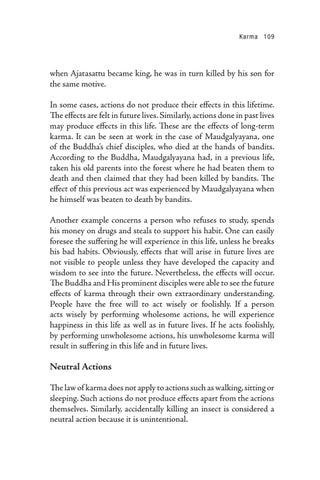Karma 109
when Ajatasattu became king, he was in turn killed by his son for the same motive. In some cases, actions do not produce their effects in this lifetime. The effects are felt in future lives. Similarly, actions done in past lives may produce effects in this life. These are the effects of long-term karma. It can be seen at work in the case of Maudgalyayana, one of the Buddha’s chief disciples, who died at the hands of bandits. According to the Buddha, Maudgalyayana had, in a previous life, taken his old parents into the forest where he had beaten them to death and then claimed that they had been killed by bandits. The effect of this previous act was experienced by Maudgalyayana when he himself was beaten to death by bandits. Another example concerns a person who refuses to study, spends his money on drugs and steals to support his habit. One can easily foresee the suffering he will experience in this life, unless he breaks his bad habits. Obviously, effects that will arise in future lives are not visible to people unless they have developed the capacity and wisdom to see into the future. Nevertheless, the effects will occur. The Buddha and His prominent disciples were able to see the future effects of karma through their own extraordinary understanding. People have the free will to act wisely or foolishly. If a person acts wisely by performing wholesome actions, he will experience happiness in this life as well as in future lives. If he acts foolishly, by performing unwholesome actions, his unwholesome karma will result in suffering in this life and in future lives.
Neutral Actions The law of karma does not apply to actions such as walking, sitting or sleeping. Such actions do not produce effects apart from the actions themselves. Similarly, accidentally killing an insect is considered a neutral action because it is unintentional.
